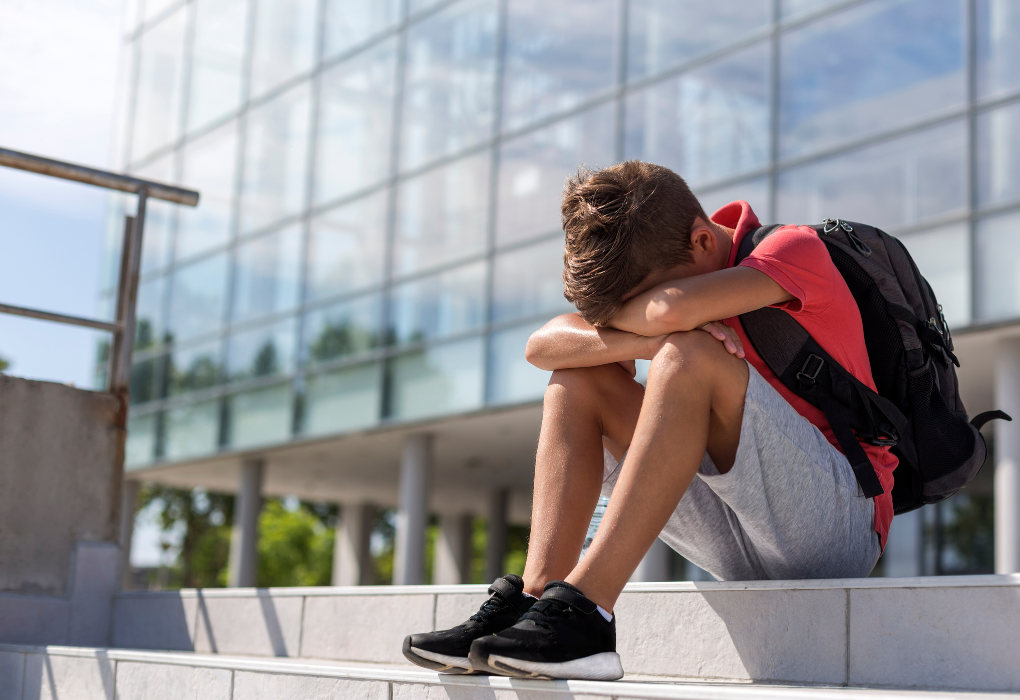It’s every parent’s worst nightmare, coming home to a teary-eyed child who was left out at school or made fun of online. Even as providers trained in the field of behavioral health and psychology, helping children navigate bullying, keeping parental emotions and stress in check, and building resilient kids particularly during a pandemic, is a challenge.
What is bullying?
Bullying is unwanted, aggressive behavior that is repeated over time and involves a power imbalance (either real or perceived). There’s a strong connection between bias and bullying; many children who are bullied are targets of bullying related to their race, immigration status, sexual orientation, religion, ethnicity, gender expression/identity or body size.
How common is it?
Bullying is unfortunately very common; studies from the CDC indicate that 15% of high school students reported being cyberbullied and 20% were bullied on school property.
Bullying has increased significantly in the last 10-15 years; 18% of people reported having been bullied at some point in their life in 2007, while that number increased to 34% in 2016.
How can you tell if your child is being bullied?
Signs of bullying include:
- School avoidance (either virtual or in-person)
- Change in school performance
- Physical injuries
- Mood or anxiety symptoms
- Change in eating or sleeping
- Physical symptoms (stomachaches, headaches)
- Self-harm or thoughts/statements about suicide
It’s important to note that many of these symptoms exist for children dealing with other concerns (i.e., depression or anxiety) that do not always stem from bullying.
What about Cyberbullying?
Cyberbullying is bullying (i.e., aggressive, unwanted behavior designed to cause emotional pain) through technology. Like other forms of bullying, cyberbullying is persistent and can be hard to notice. During the COVID-19 pandemic, kids and teenagers are spending significantly more time online creating more opportunities or venues for cyberbullying. Cyberbullying can occur on social media including Facebook, Instagram, Snapchat, TikTok, or via texting, online forums, e-mail, or online gaming.
What’s different during COVID-19 pandemic?
Increased screen time. Especially for kids who are attending school virtually or through a hybrid model, many families have relaxed their screen guidelines with respect to time and type of sites they let their children access. It is important that kids find positive ways to connect with peers virtually if they’re not connecting in person due to the pandemic, but parents and caregivers need to stay informed about what sites they’re accessing, have appropriate parental controls, set limits about when they have access, and maintain good open communication.
Decreased adult supervision. Most parents are more stressed during the pandemic, and understandably! The toll of trying to work remotely with reduced childcare availability while supporting virtual learning is overwhelming. Many kids are on electronic devices without adult supervision due to parents working while children are in virtual school.
Increased stress and isolation. Adults and kids are more stressed and less connected with others due to the pandemic. More stress and loneliness can lead to negative behavior toward peers in the case of bullies.
What can you do if you suspect your child is being bullied?
- Have open-ended conversations to learn more about what they are experiencing
- Help them navigate speaking up. Practice working on being assertive and speaking up to bullies. Help them also identify trusted adults in school they can talk to.
- Develop a plan to include reporting bullying to their school
- Promote resilience and positive coping skills
What can you do if you suspect your child is bullying others?
- Have open-ended conversations to allow for open dialogue.
- Work on strategies to build empathy (i.e., understand what others are experiencing).
- Work on apologies, which should go beyond just saying “sorry.”
- Work on social-emotional skills (more on this below!).
How can parents and teachers prevent or reduce bullying?
- Work with your student’s school to support an inclusive environment. This means every individual who students come in contact with (bus drivers, teachers, assistant teachers, principal, cafeteria employees, etc.) should be trained in how to recognize bullying and what to do when they notice it.
- There are several great programs schools can look into from a prevention perspective like Learning for Justice, Scholastic’s Anti-Bullying Resources, and Sandy Hook Promise’s Start With Hello program.
- Model appropriate social interactions and problem solving with your own friends and talk to your children about it. With many people working from home, our children are aware of some of our own personal struggles and interactions with adults, family members and friends. If you have an interpersonal challenge with a colleague, friend, or adult in the household, model how to settle a disagreement or something that upsets you. This is important for all children, including those who are at risk for bullying and children who are engaging in bullying.
- Focus on empathy building and social-emotional reciprocity; these are higher level social skills. Discussing emotions and how actions impact others’ emotions are essential skills to help your children build friendships and improve relationships. To start small, try a quick emotional-intelligence mood check in with your child.
- Boost social intelligence or social IQ at home by creating a space where everyone is needed and family members are treated equally. Create responsibilities and routines where everyone feels they have a role to play.
- Regardless of ability or disability, we can help our children understand that all of us have different strengths. Do a family strengths survey or read more about Character Strengths!



